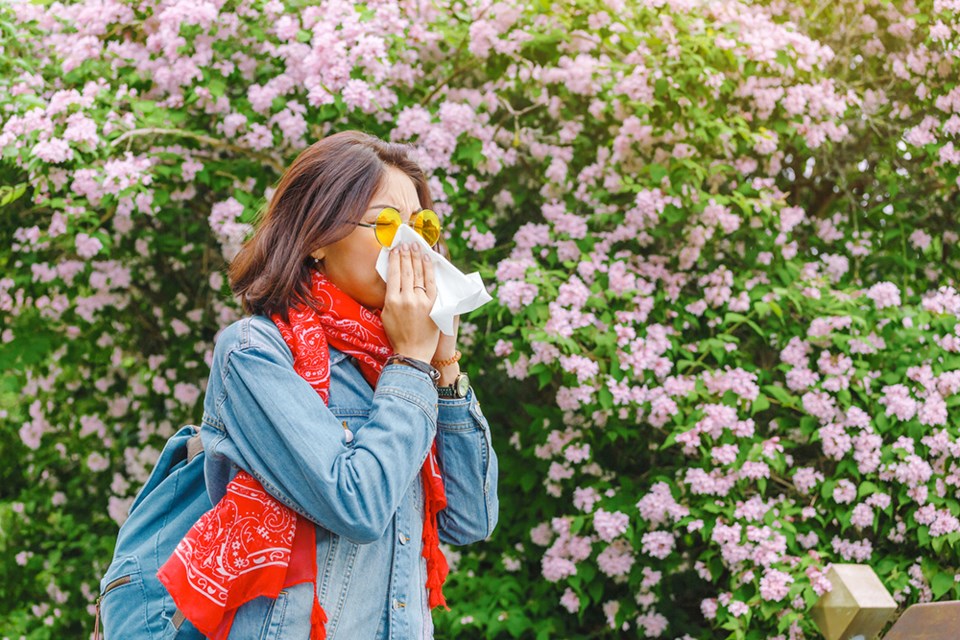Hay fever, or allergic rhinitis, is a common condition caused by a hypersensitivity to pollen, dust, pet dander and other allergens. When these substances are inhaled, they trigger inflammation in the nose, eyes, ears and throat, leading to sneezing, itchy eyes, runny nose and congestion.
Springtime is particularly challenging for hay fever sufferers, and in the qathet region, the pollen season can feel relentless due to our abundant plant life.
The body's immune system plays a crucial role in hay fever, mistakenly identifying harmless allergens as a threat, triggering a hyper-reactive response. This triggers the release of histamine and other inflammatory mediators that cause blood vessels to dilate and become leaky, resulting in the classic hay fever symptoms.
Over time, chronic inflammation can damage delicate tissues in the respiratory tract, leading to nasal polyps, chronic sinusitis and breathing problems like asthma.
Understanding regional pollen patterns helps anticipate symptom severity. Tree pollens (e.g. alder, birch, cedar) peak from March to June, grass pollens (ryegrass, fescue, Kentucky bluegrass) dominate May to July, and various weeds (broom, dock, nettles) release pollen throughout summer and early autumn. While fungal spores are present year-round, they especially predominate during the fall.
Conventional medical treatment of hay fever centres around the use of antihistamines, which come with a number of side-effects including drowsiness and dry mouth, and over time, lose their effectiveness. Nasal steroids may also be used but come with potential downsides, altering the microbiome of the nose and sinus, leading to chronic rhinosinusitis. I have seen many cases where reliance on such medications leads to severe respiratory problems such as asthma.
According to Ayurveda, hay fever stems from an imbalance of kapha dosha, characterized by heavy, wet and congesting properties, which naturally increases over winter and becomes vitiated during the springtime. This is akin to a river flooding from melting snow: the kapha floods through the body, weakening digestion and increasing congestion.
This is why implementing a spring cleanse around February by removing all those kapha-increasing influences can help prevent later hay fever issues.
The holistic treatment of hay fever encompasses a wide range of measures. In my practice, I blend Ayurveda, Chinese medicine and western herbalism, alongside nutritional support including diet and supplements. The first place I start is by improving digestion, avoiding immuno-reactive and mucus-forming foods such as flour products and dairy, and supporting overall gut health, including the liver and the gut microbiome.
Symptom management is benefitted by reducing inflammation, using herbs such as turmeric and nettle leaf, along with omega 3 fatty acids, B vitamins, magnesium and nutrients such as bioflavonoids to stable the mast cells that release histamine.
There are some useful herbal formulas for this like the Chinese herbal remedy Pe Min Kan Wan. I also provide support to the respiratory system, using herbs such as bayberry, ginger and mullein to reduce mucus, and if I suspect fungal involvement, herbs such as neem and barberry.
Longer term, I use nutrients such as the carotenoids, vitamin C and zinc to support the immune system, along with adaptogens such as astragalus, amla, ashwagandha and licorice.
As a former hay fever sufferer myself, I have a great deal of personal experience and compassion for anyone who suffers from this issue. It’s such a drag and spoils what should be a great time of year to be outside.
Fortunately, both my personal and clinical experience suggests that it is possible to get lasting relief from this chronic condition.
Todd Caldecott is a medical herbalist and Ayurveda practitioner based in the qathet region, and can be reached through the Dogwood School of Botanical Medicine website (dogwoodbotanical.com) or by email at [email protected].
Join the Peak's email list for the top headlines right in your inbox Monday to Friday.



